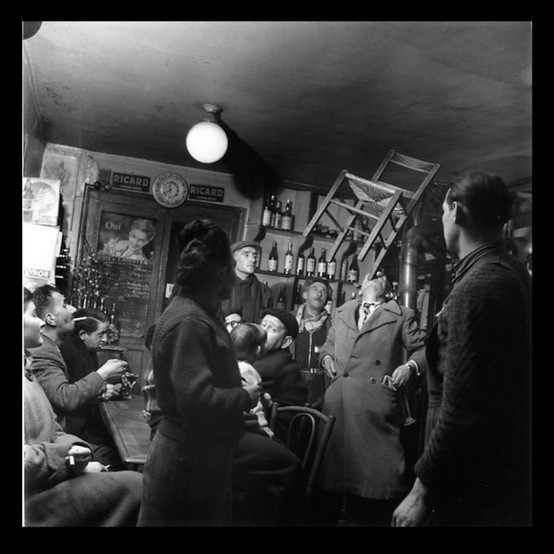Parisian Street Photography from the 30s to the 80s: Robert Doisneau
- Justus Hayes
- Mar 23, 2022
- 3 min read

"Doisneau is remembered for his modest, playful, and ironic images of amusing juxtapositions, mingling social classes, and eccentrics in contemporary Paris streets and cafes. Influenced by the work of André Kertész, Eugène Atget, and Henri Cartier-Bresson, in more than twenty books of photography, he presented a charming vision of human frailty and life as a series of quiet, incongruous moments."

The way I discovered Robert Doisneau perfectly encapsulates the way I like the internet to work. A photo came up in my Facebook feed that really tickled me in an absurdist and surreal spot that is always thirsty for content. It was an old, b&w photo of a man in a trench coat and beret holding an umbrella over a floating ghost of the bed sheet variety. I loved it. So much, in fact, that I ran a reverse image search on it (for the first time, which surprised even me) and discovered the original photo (the title image, above) by Doisneau, "Le violoncelle sous la pluie, Paris 1957," one in a series featuring cellist and actor Maurice Baquet.
Some very light Googling took me to his most famous photograph, "Le Baiser de l'hôtel de ville," 1950:

There's actually a little controversy regarding "The Kiss by the Hôtel de Ville," but for me the real hero of the photo is the tightly-buttoned guy with the firm beret just to the left of the couple. Now that I know the photo was staged, his expression makes a little more sense - "What, they're kissing again? For the camera? Mon Dieu..."
Before long, I was browsing for what probably translates into weeks in internet time, but was likely around an hour on the official Robert Doisneau website, his Atelier, and rediscovering the power and intensity of candid black and white photography. What a catalog, documenting the multi-decade career of a photographer who clearly enjoyed a good reputation, had connections, and celebrated all aspects of his time and place. I absolutely love what I have seen so far, finding it inspirational in a number of different ways. One of those ways involves using some of his images as source material for some creative expression of my own. Please see the very end of this post for some examples of that.
"Robert Doisneau was born in 1922 in Gentilly, a suburb of Paris.
After his undistinguished youth behind the macrame curtains of a conventional middle-class family, Robert is fifteen when he learns engraving and lithography at the Estienne School in Paris and starts designing labels for drug packaging.
He becames a camera assistant at André Vigneau’s studio in 1931, where he discovers artistic outlets that will spur him on. The four years he spent working for the advertising department of Renault car maker, from where he was fired for repeated lateness, led him to the attractive position of independent photographer.
World War II bursts out then, putting an end to his projects. Later, in the Parisian post-war euphoria, despite the fact that he daily deals with orders to make a living, he hoards the photos that will meet with great success, obstinately cruising where “there is nothing to see”, favoring furtive points, tiny pleasures lit by the ’ reflections of sunbeams on cities’ asphalt.
When he died in April 1994, he left behind 450,000 negatives that tell an entertaining story of his time with a tender and observant eye, which must not hide the depth of his thought, his irreverent attitude toward power and authority, his relentlessly free-thinking mind."
The following film-strip style gallery features the 10 photos I selected to post on IG and FB. Following that are further selections of Doisneau's work that caught my fancy.

Georges et Riton, rue Watt, Paris 1952

Don Carlos Byas, 1951

Frédéric Joliot au Collège de France devant le pupitre du cyclotron 1942

Chez le baron et la baronne de l949

Camouflage, Paris 1944

Au Saint Yves, 1948

Amour et belote, Paris 1950

Un oreiller en toile de jute, Paris 1952

Vernissage à la Galerie Charpentier, Paris 1949

Structure métallique pavillon Baltard, 1969

Sous sol des Halles, 1968

Sortie de messe à Saint Eustache 1968

Promenade à cheval, Palm Springs 1960

Professeur Henri Vallois, Laboratoire d'anthropologie du Museum, Paris 1943

Picasso dans l'atelier de Mougin, July 1963

Pêcheur à la mouche sèche, Paris 1951

Passage Saint Anne, 1967

Passage Jouffroy, 1976

Orchestre de Claude Abadie - Boris Vian à la trompette Alain Vian à la batterie Lelio Vian à la guitare 1945

Monsieur Mangin, janvier 1949

Mais And Mimile, Fanni Circus, 1951

Madame Treve de Garcia, voyante, 1949

Les meilleures amies, Paris 1957

Les bigoudis du-peintre, Palm Springs

Les cygnes gonflables, Palm Springs

Le Divan, rue de l'Abbaye, hiver 1940

La table qui tourne, 1943

Lancer de tracts, rue Henri Monnier, 1944

La fete, 1950

Laboratoire d'Ivry, 1942

Jacqueline Delubac au balcon, Paris 1951

Hôtel de la Louisiane, Saint Germain des prés, 1947


























Comments